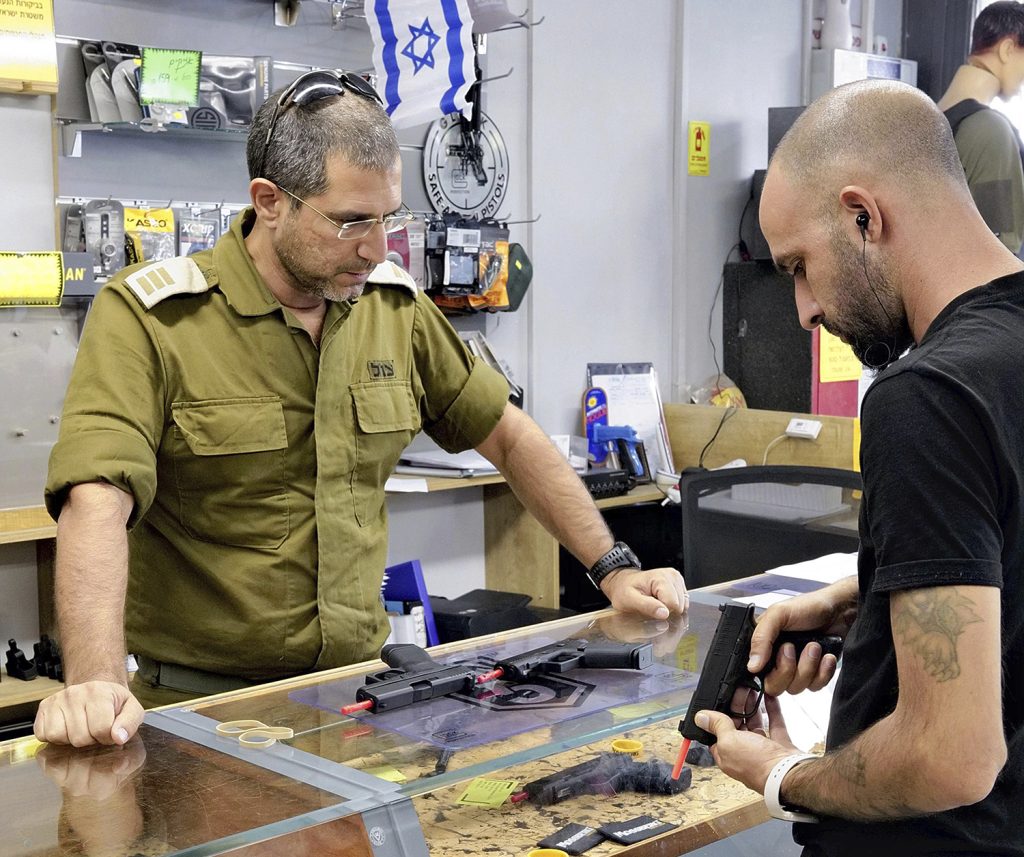
The traditional Israeli attitude to guns is often misunderstood, particularly by observers peering through an American lens. Guns are visible everywhere here, and many visitors, startled by the sight of heavily armed young men and young women in uniform carrying M-16s on the bus or at the bar, assume an enthusiasm for weapons and a free approach to acquiring them.
But Israelis have no legal right to bear arms, no fear of government tyranny in the American tradition, and a fraction of the crime fears that Americans accept as normal. (In an ordinary year, Jerusalem, a city of nearly one million residents, tends to see about a dozen violent deaths; in Indianapolis, a slightly smaller city, the homicide number tends to be over 200.)
For the average Israeli, guns are simply a tool for protection against the Arab violence that has shaped this society over the last century. Like the army, they’re a necessary evil. Most of the armed people you’ll see in an Israeli city are soldiers or police. In the United States, according to a Pew study last year, 32 percent of citizens own guns. In Israel, it was under 2 percent.
That was before October 7.
Since the attacks, more than 300,000 Israelis have requested gun permits—twice the total number of people who owned guns before. In the Tel Aviv area, the number of permit requests rose 800 percent. This may be the most visible symptom of the way our sense of safety has been shattered. For me, the change is manifest in the form of a small Glock—an ugly little monument to a change for the worse in this country and in the lives of its citizens.
Though buying a handgun here has become easier, gun ownership is still tightly restricted and involves paperwork beyond the wildest dreams of gun-control advocates in the United States. If you’re cleared for a permit by the Ministry of Internal Security after a background check of your medical and psychological records, and of your military service, and then pass a test that includes firing 100 bullets, you’re licensed to own and carry a single weapon with a serial number registered with the government under your name. You cannot buy another gun. You’re allowed to buy 100 bullets that must be accounted for each time you renew your license. It’s virtually impossible to buy a rifle.
I went through all of this after October 7, but found the real process to be less bureaucratic than psychological. I was trained to use an automatic rifle in the infantry during my mandatory army service, but like all of my friends I was happy to give the thing back. I didn’t believe that lethal force was necessary in civilian life. By the time I filled in the forms after the Hamas attack, with several acquaintances dead and one captive in a Hamas tunnel, my wife, Naama, had stocked our apartment with water, food, and batteries in case the war spread to Jerusalem. Naama can’t even look at the gun. But nightmare scenarios had been proven realistic, and it seemed irresponsible not to take every precaution.
— Matti Friedman in Why I Got a Gun

3 Responses
Mr. Friedman welcome to the real world.
I have family in Israel who have a similar mentality. Having your head violently ripped from it’s “home” in the sand can be disorienting and frightening, I suppose. From my perspective, it does not compute but I think ANY increase in self-awareness of the world around you is a good thing. As it says in the Torah, we are a stubborn, stiff-necked people… aka, idiots… lol.
“I didn’t believe that lethal force was necessary in civilian life.”
“In an ordinary year, Jerusalem, a city of nearly one million residents, tends to see about a dozen violent deaths.”
I wonder what those dozen folks thought in their last moments.